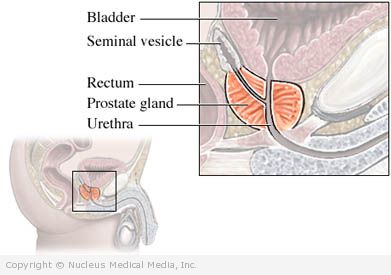(Prostadynia)
Prostatitis – Definition
Prostatitis is inflammation of the prostate gland. Inflammation is swelling, redness, and pain. The prostate is a walnut-sized gland in men that surrounds the urethra. It produces a fluid that is part of semen.
There are four types of prostatitis:
- Category 1: acute bacterial—least common of the four types, but the most common in men under 35
- Category 2: chronic bacterial—not very common, but most common in men between 40-70
- Category 3: chronic nonbacterial/prostadynia—most common type, associated with chronic pelvic pain
- Note: Prostadynia, also known as chronic pelvic pain syndrome has similar symptoms , but there is no evidence of prostatic inflammation.
- Category 4: asymptomatic inflammatory prostatitis
Prostatitis – Causes
Acute and some chronic bacterial prostatitis are caused by bacteria that infect the prostate gland. The bacteria usually come from the urinary tract or rectum.
The causes of nonbacterial prostatitis can be difficult to identify. Some feel it may be caused by a nonbacterial issue such as a virus, a fungus, or mycoplasma.
The causes of prostatodynia can be even more difficult to identify. It may be associated with stress and/or disorders of pelvic floor muscles. It may also be caused by chronic inflammation of the bladder.
The cause of asymptomatic inflammatory prostatitisis not clearly understood.
Prostatitis – Risk Factors
Factors that may increase your risk of prostatitis include:
- Medical procedures that involve inserting a catheter or other tubing into your urethra or rectum
- Anal intercourse
- Recent bladder infection
- Abnormalities in the anatomy of the urinary tract
- Diabetes
- Suppressed immune system
- Something obstructing the bladder (eg, a tumor, a kidney stone, or enlargement of the prostate gland itself)
Prostatitis – Symptoms
Symptoms of prostatitis can come on slowly or suddenly. They can be mild or quite severe. In nonbacterial prostatitis, symptoms often come and go.
Symptoms may include:
- Needing to urinate frequently and/or urgently (especially at night)
- Pain or burning while urinating
- Difficulty urinating
- Blood in the urine
- Psychological stress
- Lower abdominal pain or pressure
- Rectal or perineal discomfort
- Lower back pain
- Fever or chills
- Painful ejaculation
- Impotence (due to inflammation around the gland)
Prostatitis – Diagnosis
The doctor will ask about your symptoms and medical history. A physical exam will be done. Diagnosis of prostatitis is usually based on the symptoms and the exam.
Massaging the prostate gland may also be done in cases of chronic prostatitis. In this test, the doctor places a lubricated, gloved finger into the rectum to feel the back wall of the prostate. In prostatitis, the prostate is usually tender and soft. The doctor will push on the prostate to release fluid from it. This fluid will be analyzed.
Your doctor may also order some bladder function tests to look for any associated conditions.
Asymptomatic inflammatory prostatitis is most often found after a prostate biopsy is done for other medical conditions.
Prostatitis – Treatment
Treatment depends on the type of prostatitis:
Infectious Prostatitis
Acute bacterial prostatitis is treated with oral antibiotics for 4-6 weeks. The commonly used drugs include quinolones (norfloxacin, ciprofloxacin, levofloxacin) or trimethoprim. The antibiotics may be given through an IV antibiotics for severe infections.
Chronic bacterial prostatitis is also treated with oral antibiotics for 4-12 weeks.
Other medications to help manage symptoms include:
- Stool softeners
- Anti-inflammatory medications
- Other analgesics or pain medications
- Alpha-blockers such as Flomax
- 5-alpha reductase inhibitors such as Proscar or Avodart
Your doctor may recommend that you avoid alcohol and caffeinated beverages.
Noninfectious Prostatitis
Initially you may be given a course of antibiotics. This is just in case an infectious cause was missed. Other treatments to manage symptoms include:
- Alpha-blockers such as Flomax
- 5-alpha reductase inhibitors such as Proscar or Avodart
- Anti-inflammatory medications such as ibuprofen
- Other analgesics or pain medications
- Warm sitz baths
- Repeated prostate massages
Prostatitis – Prevention
There are no guidelines for preventing prostatitis.

